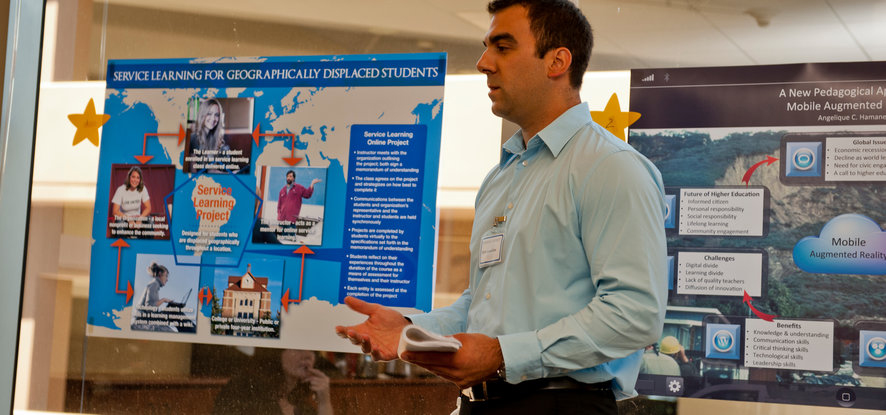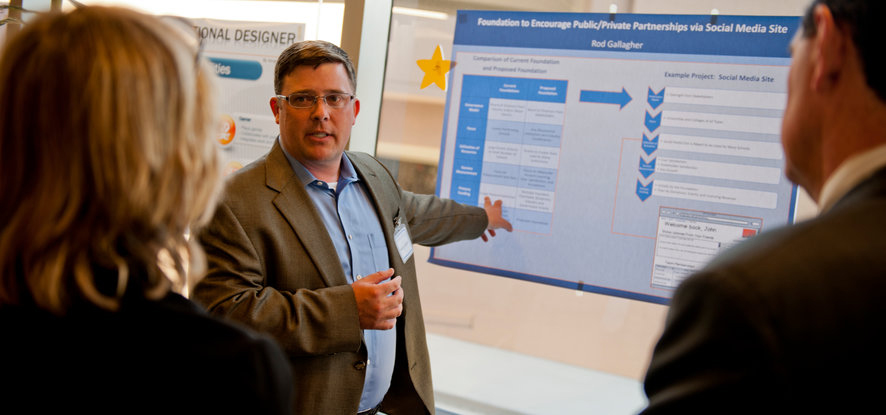Types of Teaching Degrees

Working in education can not only offer a rewarding career, but also the chance to change students' lives for the better. The first steps to becoming a teacher is to complete a teacher education program and obtain a teaching certification. Depending on where you are in your professional career and the type of teaching job you'd like to have, future educators have several options when it comes to the types of teaching degrees available.
Some degrees (like those for undergraduate students) lead to teacher licensure, while others allow students to improve their teaching career with advanced degrees. One thing all the degree programs below have in common is they'll help set you up for a successful career in education, no matter what grade level or age group you want to teach.
Undergraduate Programs
Undergraduate programs in education are designed to provide a strong foundation for those who want to enter the teaching profession. Whether it's working with young children in early childhood settings, teaching in elementary schools, specializing in special education, or focusing on a specific subject for secondary education classes, undergraduate degrees typically provide a path to initial teacher certifications.
Bachelor's Degree in Elementary Education
A Bachelor's Degree in Elementary Education is for students who want to become elementary school teachers. This four-year program provides students with the skills and knowledge to teach young learners, typically in grades K-6. An elementary teaching degree program blends theory with practical experience, offering opportunities to learn about child development, curriculum planning, and effective teaching strategies.
Who It's For: Future elementary school teachers who want to work with young children in grade levels K-6.
Program Length: 4 years
What You'll Learn: Foundational teaching methods, child psychology, curriculum development, and classroom management for young learners.
Admissions Requirements: High school diploma or equivalent, SAT/ACT scores
Career Outcomes:
- Public school elementary teacher: Public school teachers work within a school district, teaching elementary school students in grades kindergarten through sixth. They are responsible for creating lesson plans, assessing student progress, and nurturing a positive learning environment.
- Private school elementary teacher: Private school elementary teachers share many of the same responsibilities as their public school counterparts but operate within privately-funded educational settings. They educate elementary school students, focusing on both academic curriculum and often, specific educational philosophies or religious teachings unique to their private institution.
- Teacher assistant: Teaching assistants are education staff who play a supportive role in both public and private school settings, often working closely with elementary school students. Their primary role is to assist the lead teacher in daily classroom activities, helping to manage the class and provide individual attention to students.
- Substitute teacher: A substitute teacher temporarily fills in for absent public school teachers at the elementary, middle, or secondary education levels. While some districts will allow people to substitute teach without a teaching license or degree in education, most offer priority to certified teachers.
- School paraprofessionals: Paraprofessionals provide essential support to students, particularly in elementary and secondary education. They often work alongside teachers to offer additional assistance to students with special needs or those who require extra help.
Bachelor's Degree in Early Childhood Education
A Bachelor's Degree in Early Childhood Education is designed for those who are interested in teaching children from birth to kindergarten. An early childhood education degree program focuses on the developmental needs and learning styles of young children. Students learn to create engaging, age-appropriate learning experiences, focusing on the physical, cognitive, and emotional development of children.
Who It's For: Future early childhood education teachers who want to teach children from birth to kindergarten.
Program Length: 4 years
What You'll Learn: Early childhood development theories, instructional strategies for young children, and managing early childhood educational settings.
Admissions Requirements: High school diploma or equivalent, SAT/ACT scores.
Career Outcomes:
- Preschool teachers: Preschool teachers play a crucial role in early childhood development, utilizing their expertise in the education field to create a foundational classroom experience for young learners.
- Daycare teacher: Daycare teachers provide nurturing and educational experiences in a daycare setting that set the foundation for future learning as children grow.
- Childcare center director: A childcare center director oversees early childhood education programs, bringing expertise in the education field and experience in managing classroom environments to ensure high-quality care and learning experiences.
Bachelor's Degree in Special Education
A Bachelor's Degree in Special Education is a comprehensive program for those passionate about teaching students with special needs. Over four years, this program provides in-depth knowledge of diverse learning abilities, including strategies to support students with developmental delays, ADHD, autism, and more. The curriculum covers assessment techniques, individualized education plans (IEPs), and inclusive teaching methods.
Who It's For: Those with a passion for teaching students with special needs, including developmental delays, ADHD, autism, and other learning differences.
Program Length: 4 years
What You'll Learn: Techniques for inclusive education, individualized lesson planning, and adaptive teaching methods.
Admissions Requirements: High school diploma or equivalent, SAT/ACT scores.
Career Outcomes:
- Special education teacher: A special education teacher is a licensed teacher specializing in working with special education students. They use unique instructional techniques to provide individualized educational opportunities in a supportive classroom environment.
- Reading specialist: A reading specialist focuses on enhancing literacy skills through specialized instructional techniques. They often work alongside classroom teachers to identify and support students' reading needs.
- Support services coordinator: A support services coordinator facilitates and organizes educational opportunities for students, collaborating with classroom teachers and other professionals to implement effective instructional techniques and support strategies.
Specific Subject Degrees
Future middle school and high school teachers typically focus on a particular subject, such as math, science, English, art, foreign language, or physical education. Students gain a deep understanding of their chosen field and have opportunities to take additional education-specific courses. They may also choose to pursue a master's degree with teacher licensure after obtaining their undergraduate degree in their chosen subject.
Who It's For: Secondary education teachers who want to teach a specific subject in middle school or high school.
Program Length: 4 years
What You'll Learn: In-depth knowledge of the chosen subject area, pedagogical techniques, and curriculum development.
Admissions Requirements: High school diploma or equivalent, SAT/ACT scores.
Career Outcomes:
- Specific subject or grade level middle school teacher
- High school teacher
- Art teacher
- Physical education teacher
- Music teacher

Master's Degrees
Master's degree programs offer advanced education and training for those looking to grow in their teaching careers or enter the profession with a higher degree of specialization. These programs provide a more in-depth look into specialized areas of education.
Master of Arts in Teaching
The Master of Arts in Teaching (MAT) at Pepperdine University is an advanced program for education professionals and those who want to enter the teaching profession and already hold a bachelor's degree in another field. This 11-month program offers a blend of online learning and in-person instruction that covers theoretical and practical learning and leads to an initial teaching license. The curriculum covers advanced teaching methods, educational research, and specialization options.
Who It's For: Education professionals who want to improve their teaching skills or future teachers with a bachelor's degree in a related field who want to obtain a teaching license.
Program Length: 11 months
What You'll Learn: Advanced teaching methods, educational research, and specialization in a specific teaching area.
Admissions Requirements: Bachelor's degree, letters of recommendation, Statement of Purpose
Statement of Responsibility, Basic Skills Requirement (CBEST), California Subject
Examination for Teachers (CSET).
Career Outcomes:
- elementary, middle, or high school teacher
- department head
- instructional design leader
- education consultant
- district-level leader
Master of Arts in Teaching English to Speakers of Other Languages (TESOL)
The MAT in TESOL is an intensive 11-month program for those who want to teach English to non-native speakers, either domestically or internationally. This program focuses on linguistics, teaching methodologies for ESL, and cultural competencies.
Who It's For: Those who want to teach English either in the United States or internationally.
Program Length: 11 months
What You'll Learn: Linguistics, pedagogy for teaching English as a second language, and cultural competency.
Admissions Requirements: Bachelor's degree, proficiency in English, letters of recommendation, and a personal statement.
Career Outcomes:
- English teacher domestically for children or adults
- English teacher abroad
- English teacher online
- ESL college professor
- Private tutor
- Translator
- ESL curriculum or department head
- Language school leader
Master of Science in Learning Design and Technology
The 15-month Master of Science in Learning Design and Technology program is ideal for professionals who are interested in the intersection of education and technology. The curriculum focuses on integrating cutting-edge technology into learning environments. Students learn about digital content creation, instructional design, and technology implementation strategies. This degree is offered as either an online degree program or an in-person program.
Who It's For: Individuals interested in integrating technology with education and those who need the option of a fully online program.
Program Length: 15 months
What You'll Learn: Educational technology, digital content creation, and instructional design.
Admissions Requirements: Bachelor's degree, letters of recommendation, and a personal statement.
Career Outcomes:
- Technology department head
- Technology teacher
- Business training consultant
Doctoral Degrees
Doctoral degrees are the highest level of academic achievement in the field of education. These programs are designed for professionals looking to make a significant impact in educational policy, administration, or innovative educational technology. The programs offer intensive study and research opportunities, enabling candidates to contribute new insights and leadership in their areas of expertise. Graduates of the doctoral programs often pursue careers as educational administrators, policy makers, university faculty, or specialists in educational technologies.
EdD in Learning Technologies
The Doctorate in Education (EdD) in Learning Technologies is a three-year program geared towards professionals looking to drive innovation in educational settings through technology. This program covers advanced learning technologies, digital transformation strategies, and research methodologies.
Who It's For: Professionals aiming to innovate and implement technology in educational settings.
Program Length: 3 years
What You'll Learn: Advanced learning technologies, digital transformation in education, and research methodologies.
Admissions Requirements: Bachelor & Master's Degrees, Letters of Recommendation, Statement of Purpose, Resume, Interview, Writing Sample
Career Outcomes:
- Instructional coordinator
- Director of Innovation
- Educational software developer
EdD in Educational Leadership Pre-K to 12
Pepperdine's EdD in Educational Leadership Pre-K to 12 is a three-year doctoral program for those aspiring to hold leadership positions in K-12 education systems. The curriculum focuses on developing strong leadership skills, understanding educational policies, and implementing effective school management practices.
Who It's For: Education professionals who want to advance as leaders in K-12 education systems.
Program Length: 3 years
What You'll Learn: Theories and practices that support research and development of national and global policy, advanced leadership techniques, and change initiatives throughout organizations.
Admissions Requirements: bachelor & Master's Degrees, Letters of Recommendation, Statement of Purpose, Resume, Interview, Writing Sample
Career Outcomes:
- Principal
- K-12 Administrator
- Educational Consultant
- Instructional Coordinator
- University Faculty

How to Choose an Advanced Degree Program
How do you choose the best master's program for teachers? You'll need to carefully consider your current capacity for furthering your education, your future career goals and available career opportunities, and your past educational experience.
Whether you're looking for teacher licensure, a role in education administration, or a specialized position in curriculum design, instruction techniques, or technology; choosing the right graduate program will give you tools you need to be successful.
Here are some things to consider when selecting an advanced degree in education:
- Alignment with Career Goals: Think about where you see yourself in the field of education. Are you looking for
K-12 opportunities, or are you aiming for a role in education administration? Defining
your long-term career goals will help you decide which graduate program aligns with
your future goals.
- Teacher Licensure: If your goal is to become a licensed educator, make the program you choose meets
the licensure requirements in your state or region. Some graduate programs offer a
pathway to teacher licensure alongside advanced education training, which can be a
great way to achieve your career objectives.
- Educational Experience: Consider your current level of education. If you're already a current teacher, you
might look for programs that build on your existing skills. If you're new to the field,
seek programs that provide foundational knowledge along with advanced study.
- Program Flexibility and Support: Finally, consider the format and structure of the graduate program. For working
professionals, programs offering part-time, online, or evening classes can provide
the necessary flexibility. If you're looking for an initial teacher license, keep
in mind that you will most likely need to have the availability for full-time student
teaching.
If you have a passion for shaping the lives of students and see a career as a successful teacher in your future, consider an advanced teaching degree from Pepperdine University. You can find out more about the MA in Teaching and other master's and doctoral level programs by visiting the Pepperdine University Graduate School of Education website.